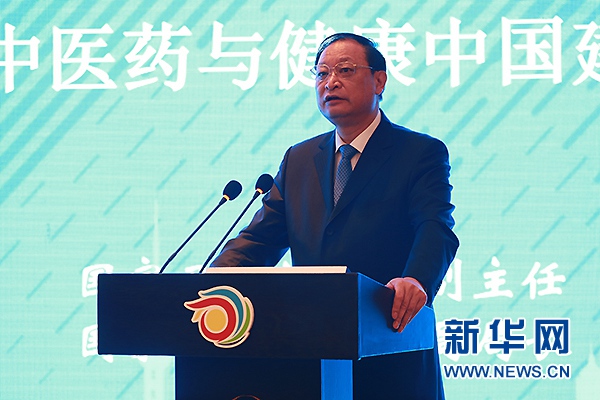


Wang Guoqiang, China's vice minister of National Health and Family Planning Commission and commissioner of the State Administration of Chinese Traditional Medicine, delivers a speech during the Chinese Medicine Development Forum at the 9th Global Conference on Health Promotion in Shanghai, Nov. 23, 2016. (Photo/Xinhua)
Wang Guoqiang, China's vice minister of the National Health and Family Planning Commission and commissioner of the State Administration of Chinese Traditional Medicine, introduced China's TCM development at the Chinese Medicine Development Forum at the 9th Global Conference on Health Promotion in Shanghai on Nov. 23. In his keynote speech, Wang outlined a proposal for the joint development of TCM.
According to Wang, China attaches great importance to the development of traditional Chinese medicine. The Chinese government has established a TCM service system covering the whole nation, launched preventative TCM treatment programs, carried out TCM promotion activities and published a series of TCM guidelines.
China has raised the development of TCM to the national level. The outline of the Healthy China 2030 plan, published in October of this year, states three clear goals related to traditional Chinese medicine: improving the capacity of TCM, developing preventative and standard health services based on TCM principles, and promoting the preservation and innovation of TCM.
Wang pointed out that TCM boasts advantages spanning health, economics, technology, culture and ecology. Furthermore, TCM is not only a resource for China, it is also China's contribution to humanity. For instance, the discovery of Artemesinin by Chinese scientist Tu Youyou has greatly reduced the mortality rate for malaria patients worldwide.
The “vision and actions” plan for the Belt and Road Initiative, which was unveiled in March 2015, states: "We will expand cooperation on traditional medicine." Currently, TCM has spread to 183 countries and regions around the world. Statistics from WHO show that acupuncture and moxibustion have been embraced by 103 member countries, and there are over 80,000 TCM institutions worldwide. China has signed 86 specialized TCM cooperative agreements, providing a solid platform for bilateral communication and cooperation.
Wang introduced a three-point proposal to develop TCM. Firstly, he suggested giving full play to TCM in promoting health, pushing the integration of TCM into the national health system, exploring the essence of traditional medicine in each country, and realizing creative transformation and development. Secondly, Wang said China should carry out exchanges and cooperation in traditional medical science. Thirdly, China should promote the formulation of international criteria for traditional medicine.
"We will strengthen the development of TCM and promote its modernization and internationalization," Wang promised in an interview with People's Daily Online.
 Fire brigade in Shanghai holds group wedding
Fire brigade in Shanghai holds group wedding Tourists enjoy ice sculptures in Datan Town, north China
Tourists enjoy ice sculptures in Datan Town, north China Sunset scenery of Dayan Pagoda in Xi'an
Sunset scenery of Dayan Pagoda in Xi'an Tourists have fun at scenic spot in Nanlong Town, NW China
Tourists have fun at scenic spot in Nanlong Town, NW China Harbin attracts tourists by making best use of ice in winter
Harbin attracts tourists by making best use of ice in winter In pics: FIS Alpine Ski Women's World Cup Slalom
In pics: FIS Alpine Ski Women's World Cup Slalom Black-necked cranes rest at reservoir in Lhunzhub County, Lhasa
Black-necked cranes rest at reservoir in Lhunzhub County, Lhasa China's FAST telescope will be available to foreign scientists in April
China's FAST telescope will be available to foreign scientists in April "She power" plays indispensable role in poverty alleviation
"She power" plays indispensable role in poverty alleviation Top 10 world news events of People's Daily in 2020
Top 10 world news events of People's Daily in 2020 Top 10 China news events of People's Daily in 2020
Top 10 China news events of People's Daily in 2020 Top 10 media buzzwords of 2020
Top 10 media buzzwords of 2020 Year-ender:10 major tourism stories of 2020
Year-ender:10 major tourism stories of 2020 No interference in Venezuelan issues
No interference in Venezuelan issues
 Biz prepares for trade spat
Biz prepares for trade spat
 Broadcasting Continent
Broadcasting Continent Australia wins Chinese CEOs as US loses
Australia wins Chinese CEOs as US loses